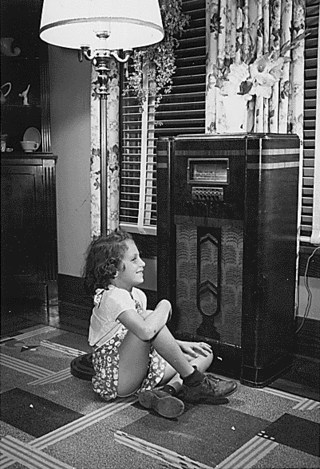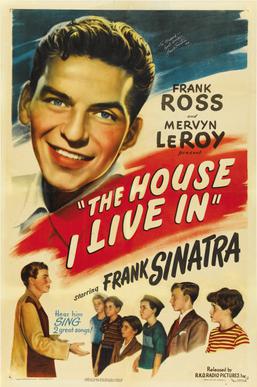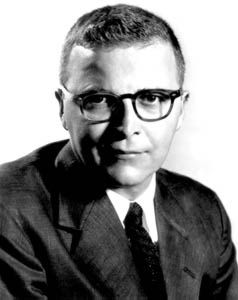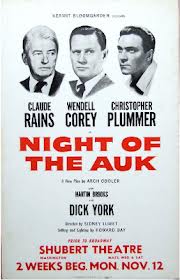
The Somonyng of Everyman, usually referred to simply as Everyman, is a late 15th-century morality play. Like John Bunyan's 1678 Christian novel The Pilgrim's Progress, Everyman uses allegorical characters to examine the question of Christian salvation and what Man must do to attain it.

Radio drama is a dramatized, purely acoustic performance. With no visual component, radio drama depends on dialogue, music and sound effects to help the listener imagine the characters and story: "It is auditory in the physical dimension but equally powerful as a visual force in the psychological dimension." Radio drama includes plays specifically written for radio, docudrama, dramatized works of fiction, as well as plays originally written for the theatre, including musical theatre, and opera.

The Golden Age of Radio, also known as the old-time radio (OTR) era, was an era of radio in the United States where it was the dominant electronic home entertainment medium. It began with the birth of commercial radio broadcasting in the early 1920s and lasted through the 1950s, when television gradually superseded radio as the medium of choice for scripted programming, variety and dramatic shows.

"In the Mood" is a popular big band-era jazz standard recorded by American bandleader Glenn Miller. "In the Mood" is based on the composition "Tar Paper Stomp" by Wingy Manone. The first recording under the name "In the Mood" was released by Edgar Hayes & His Orchestra in 1938.

Lights Out is an American old-time radio program devoted mostly to horror and the supernatural.

I Love a Mystery is an American radio drama series that aired 1939–44, about three friends who ran a detective agency and traveled the world in search of adventure. Written by Carlton E. Morse, the program was the polar opposite of Morse's other success, the long-running One Man's Family.

The House I Live In is a ten-minute short film written by Albert Maltz, produced by Frank Ross and Mervyn LeRoy, and starring Frank Sinatra. Made to oppose anti-Semitism at the end of World War II, it received an Honorary Academy Award and a special Golden Globe Award in 1946.
Flywheel, Shyster, and Flywheel is a situation comedy radio show starring two of the Marx Brothers, Groucho and his older brother Chico Marx, and written primarily by Nat Perrin and Arthur Sheekman. The series was originally broadcast in the United States on the National Broadcasting Company's Blue Network beginning November 28, 1932, and ended May 22, 1933. Sponsored by the Standard Oil Companies of New Jersey, Pennsylvania and Louisiana and the Colonial Beacon Oil Company, it was the Monday night installment of the Five-Star Theater, an old-time radio variety series that offered a different program each weeknight. Episodes were broadcast live from NBC's WJZ station in New York City and later from a sound stage at RKO Pictures in Los Angeles, California, before returning to WJZ for the final episodes.

Louis Dilman Merrill was an American actor, who worked primarily in radio from the 1930s through the 1950s.
Raymond Edward Johnson was an American radio and stage actor best remembered for his work on Inner Sanctum Mysteries.

Arch Oboler was an American playwright, screenwriter, novelist, producer, and director who was active in radio, films, theater, and television. He generated much attention with his radio scripts, particularly the horror series Lights Out, and his work in radio remains the outstanding period of his career. Praised as one of broadcasting's top talents, he is regarded today as a key innovator of radio drama. Oboler's personality and ego were larger than life. Radio historian John Dunning wrote, "Few people were ambivalent when it came to Arch Oboler. He was one of those intense personalities who are liked and disliked with equal fire."

Frederick Hayden Hughs Coe was an American television producer and director most famous for The Goodyear Television Playhouse/The Philco Television Playhouse in 1948-1955 and Playhouse 90 from 1957 to 1959. Among the live TV dramas he produced were Marty and The Trip to Bountiful for Goodyear/Philco, Peter Pan for Producers' Showcase, and Days of Wine and Roses for Playhouse 90.

American Radio Archives is located within the Thousand Oaks Library in Thousand Oaks, California and contains one of the largest collections of radio broadcasting in the United States and in the world. The archives was established in 1984 by the Thousand Oaks Library Foundation. The collections include 23,000 radio and TV scripts, 10,000 photographs, 10,000 books on radio history, and 5,000 audio recordings. The archives also house manuscripts, sound recordings, scripts, books, photographs and other materials related to the history of radio and radio broadcasting.

The First Nighter Program was a long-running radio anthology comedy-drama series broadcast from November 27, 1930, to September 27, 1953. The host was Mr. First Nighter (Charles P. Hughes, Macdonald Carey, Bret Morrison, Marvin Miller, Don Briggs and Rye Billsbury.
Gang Busters is an American dramatic radio program heralded as "the only national program that brings you authentic police case histories." It premiered on January 15, 1936, and was broadcast over 21 years through November 27, 1957.
Arch Oboler's Comedy Theater was an early American comedy television program. It aired on ABC for six episodes from September 23 to November 4, 1949. It was an anthology series of sorts, with each episode featuring a different set of characters. At least one episode consisted of three unrelated comedy segments. At least some of the episodes exist as kinescope recordings, representing early examples of television comedy.
Everyman's Theater was a 30-minute old-time radio dramatic series. Its 26 episodes were broadcast on NBC from October 4, 1940, through March 28, 1941.

Electrical transcriptions are special phonograph recordings made exclusively for radio broadcasting, which were widely used during the "Golden Age of Radio". They provided material—from station-identification jingles and commercials to full-length programs—for use by local stations, which were affiliates of one of the radio networks.

Night of the Auk is a 1956 Broadway drama in three acts written by Arch Oboler. It is a science fiction drama in blank verse about space travelers returning to Earth after the first Moon landing. The play was based on Oboler's radio play Rocket from Manhattan, which aired as part of Arch Oboler's Plays in September 1945. Night of the Auk was published in book form in 1958.














